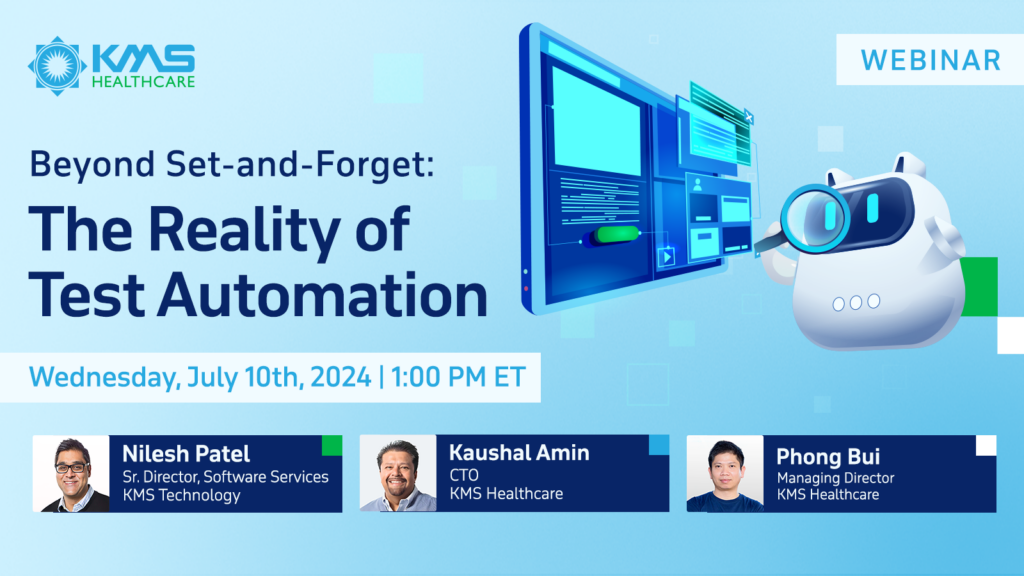As cuts come into 2024, will HealthTech leaders view test automation as a low-value tactic, or acknowledge its role in delivering high-quality software faster than your competitors?
In our latest webinar, Beyond Set-and-Forget: The Reality of Test Automation, we hosted a panel discussion to provide you with diverse perspectives from our experts.

Generally speaking, our speakers shared their tips on maximizing the value of automation efforts while examining how AI influences automation testing. Key points you’ll learn in this webinar include:
- Why test automation is more than a one-time investment
- How to keep your automated test suites up-to-date with industry changes
- Real-world applications and success stories
- AI’s possibilities for automation testing
Our Panel Discussion
The recap is available here for your reference in case you need a brief overview of what our experts discussed throughout the webinar.
1. Best Practices for Maintaining Test Automation
Our host kicked off the panel discussion with the very first, and foundational question: “What are some good practices for maintaining test automation without slowing down development?”
Nilesh suggested prioritizing critical functions instead of automating everything. He emphasized the importance of separating test data from test logic, collaboration between testers and developers, and integration of automation tools into CI/CD pipelines.
“You have to look at both the life cycle of the software development and the fact that testing is important so that your customers are not negatively impacted when code goes to production.”
Kaushal recommended a combination of manual and automated testing to ensure new features are tested and released promptly without delaying automation.
2. Adapt Test Automation to Changing Requirements
The next question on the list is “How do you keep test automation up to date with frequent changes to healthcare software requirements?”
Phong highlighted continuous maintenance in dynamic software environments, utilizing AI and machine learning to automate test case generation.
“We update our test cases regularly to match the latest software requirements, ensuring their effectiveness in catching new issues.”
Nilesh agreed with Phong, adding that fundamental practices for test automation are continuously reviewing and monitoring your test cases, scripts, and environments, all of which can be applied to both healthcare and non-healthcare software.
Kaushal’s viewpoint centered around the human side. He highlighted the importance of investing in test automation with a long-term mindset by having full-time automation engineers to ensure that test suites remain up-to-date.
3. Common Mistakes with Continuous Testing
Speaking of best practices, our host proceeded with the next question: What common mistakes do people usually make with continuous testing and how can they be fixed?
Kaushal stressed again the mistake of insufficient long-term investment in test automation, which causes “automation teams to be not able to keep up with the manual testers at the sprint level to maintain the regression test suite at a healthy level.”
Nilesh pointed out another common mistake that many organizations make is to overlook integrating tests into the CI/CD pipeline and run tests ad hoc instead.
“Integrating your automation tests into your CI/CD pipeline is crucial. Without this setup, you risk lagging far behind in your development process.”
4. Measure the Value and Success of AI and Automation Testing
We moved forward by delving into how AI can improve automation testing in health tech. Our experts agreed that AI helped improve efficiency by reducing test execution time as well as increasing accuracy when identifying issues that manual testing might miss. AI could also broaden comprehensive coverage and advance predictive analysis of automated testing.
To evaluate the effectiveness of AI, several key criteria were proposed by Phong such as execution time, defect detection, test coverage, and cost savings
Kaushal claimed that this evolution would help organizations deal with challenges caused by limited resources for manual test automation. He raised the application of the 80/20 rule: 80% of test cases are generated and maintained automatically by AI tools, while the remaining 20% will require manual intervention.
Audience Q&A
We received lots of questions via chatbox and answered some directly.
- What is the biggest risk if you don’t keep up with your test automation in healthcare?
- How can we justify the cost of continuous test automation to maintenance, rather than to our board?
The three main concerns are financial penalties, quality sacrifice, and patient safety. Others are related to time to market, regulatory compliance, and efficiency.
Check out the recording to hear how our panelists responded!
Closing The Show and Take Actions
Here are some key takeaways from our experts’ sharing:
- Nilesh: Integrate automation tools integration into CI/CD pipelines and focus on testing core functionalities.
- Kaushal: Foster close collaboration between manual and automated testing teams, developers and testers. Build a culture that views automated testing as a strategic long-term investment.
- Phong: Continuously adapt to new requirements and leverage AI’s power to elevate your automation efforts to the next level.
We are KMS Healthcare, a healthcare technology provider with over 15 years of experience. We offer dedicated teams of experts with a proven track record of developing successful solutions that shatter healthcare industry market expectations.
Our technology team is here to help you maximize the value of automation efforts while demonstrating a strong ROI to key decision-makers. Get in touch with our team today and start discussing your business needs.
